Starkweather Award
The Mary Starkweather Award honors an outstanding woman from the local community who advocates for social justice issues and demonstrates traits of generosity, selflessness, progressiveness and risk-taking. The Women's and Gender Studies Community Board administers the award and selects the awardee annually.
This award in named in honor of Mary Starkweather (1819–1897). In 1841, she and her husband, John, moved to a 160-acre farm which is now the campus of EMU. The first American women's movement in the 19th century unleashed the talents of progressive women like Mary Starkweather. As an active women's club member, her Ypsilanti city home became the Ladies Library in 1890, and in 1897, she funded Starkweather Hall on the EMU campus, now on the National Historic Register.
2023 Starkweather Award Recipients Senator Debbie Stabenow
and Lois Allen-Richardson
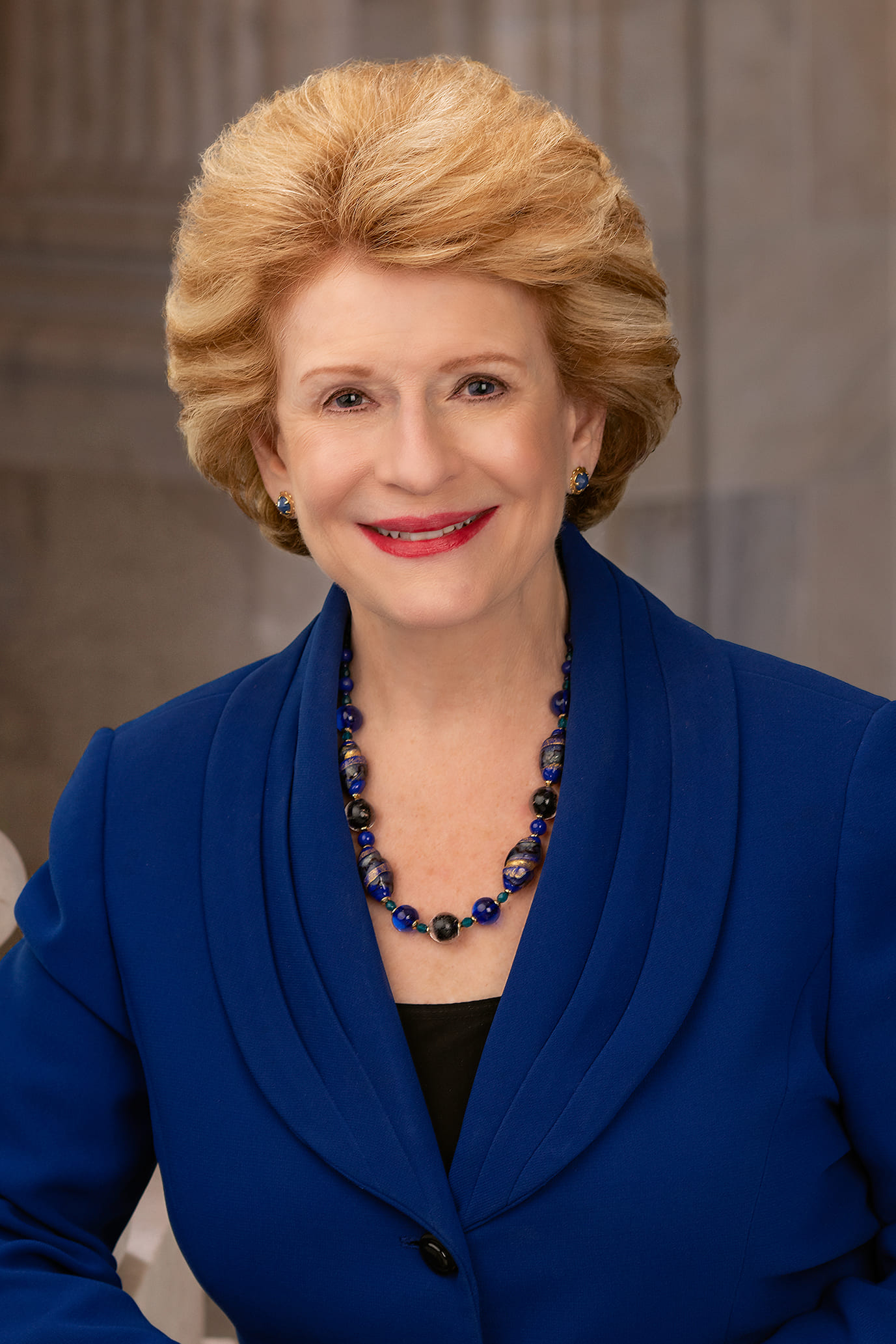

2023 Starkweather Award Recipient Senator Debbie Stabenow
Senator Debbie Stabenow made history in 2000 when she became the first woman from Michigan elected to the United States Senate. Today she is a key member of Senate Democratic leadership who is recognized for her ability to build coalitions and get things done for Michigan and our nation. Senator Stabenow has been a champion for LGBTQ equality her entire career. She is a sponsor of the Equality Act and helped pass the Matthew Shepard Hate Crimes Prevention Act. For this work, she has received the NAACP’s Helping to Heal the Nation Award a 100% score from the Human Rights Campaign during the 114th Congress. Senator Stabenow is a national leader in the effort to make sure people have quality health care, including mental health and addiction treatment. Senator Stabenow is the most senior woman Senator to ever serve on the Senate Finance Committee, a senior member of the Budget Committee, and a member of the Environment and Public Works Committee. These positions give her a powerful role to play in shaping our nation’s manufacturing, energy, health care, and agriculture policies.
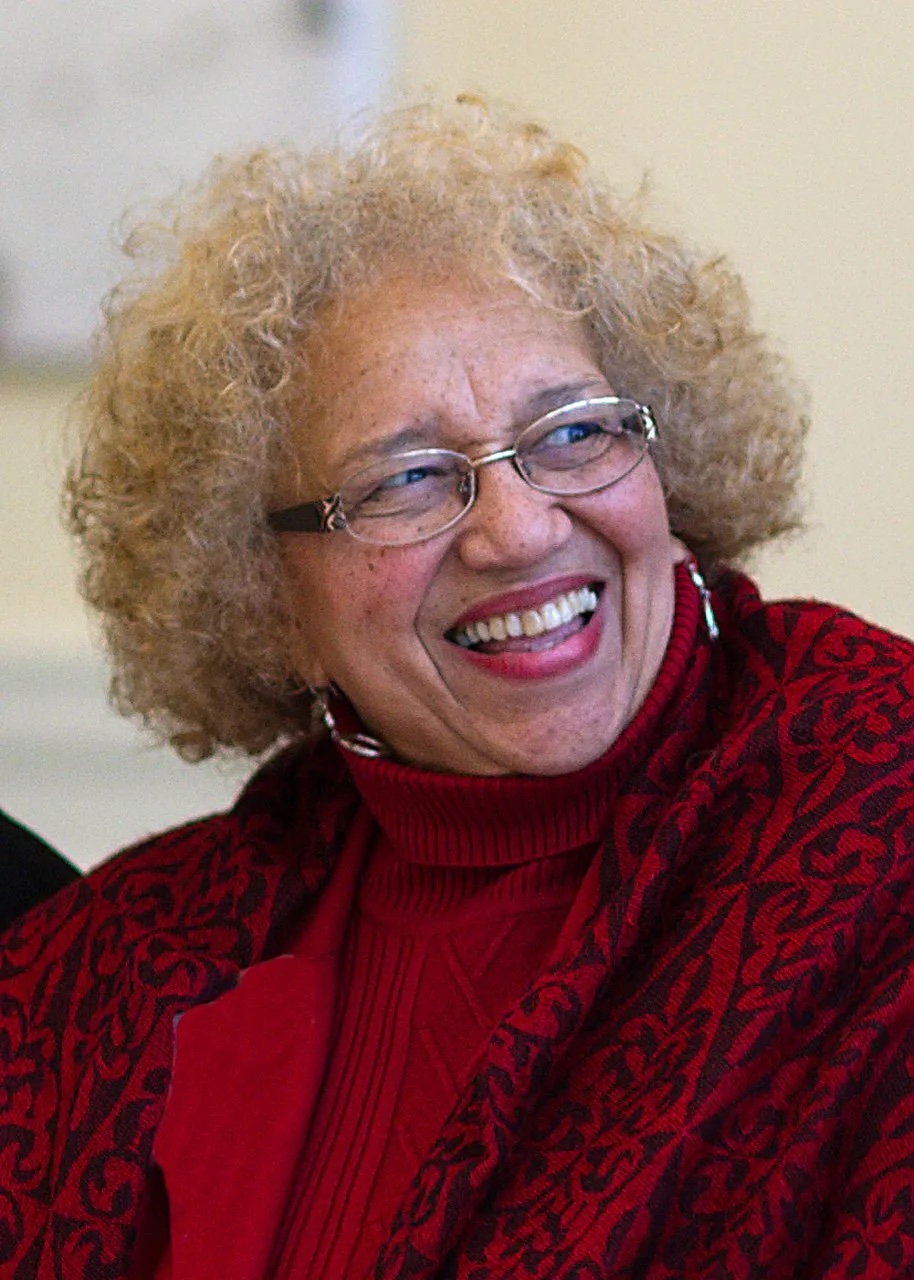

2023 Starkweather Award Recipient Lois Allen-Richardson
Lois Allen-Richardson was the first Black woman mayor of Ypsilanti. After serving on city council for twenty years, she became the mayor in 2020. An alumna of EMU, Allen-Richard received her BA in Social
Work in 1965. During her time on city council and in the mayor’s office, Allen-Richardson adv0cated for the needs of Ypsilanti residents, including the large African-American population. As part of this, she worked with other city residents to create a Community Benefits Ordinance that requires developers to negotiate with representatives from the city in addition to city council. In 2022, the Michigan Legislature presented her with a tribute signed by Governor Whitmer honoring her work for the Ypsilanti community. She hopes that her legacy will be that “all she did was straight from the heart.”
2019 Starkweather Award Recipients Betty Barber, Daryl Hafter, and Rachel Brett Harley, 3 of the founders of Women's and Gender Studies at EMU
EMU Emerita Professor Betty L. Barber was the 3rd (1979-80) and 6th (1985-86) program director for women’s studies. She came to EMU from teaching Family Relations in Fenton and Wayne-Westland high schools, starting as a lecturer in EMU’s Department of Home Economics in 1969. She believes her affiliation with women’s studies was “natural” because, unlike many disciplines, her field of Home Economics ALWAYS included women—as wives, mothers, consumers, culinary and textile arts practitioners, etc. She remembers walking by the first women’s studies class, team-taught without pay in Roosevelt Hall in 1971-72, and thinking she needed to become involved in this new multi-disciplinary endeavor. She was born in Hartford, MI, and raised pigs in 4H for her college fund. She has degrees from Michigan State University and Eastern Michigan University.
EMU Emerita Professor Daryl M. Hafter was the 4th program director (1981-83) in women’s studies. Hired as a lecturer in EMU’s Department of History & Philosophy in 1969, she was a passionate advocate of scholarship on women and a quietly effective organizational voice for women’s studies. For years, the EMU program was administered out of a file drawer in Margaret (Peggy) Rossiter’s (1914-1991) office, first program director of women’s studies at EMU. Daryl was especially successful in soliciting ‘nickels and dimes’ from myriad university administrators to keep the program afloat in the 1970s. Daryl’s scholarly contributions include field-defining accounts of women workers in 18th century France (3 books). Daryl has a BA from Smith College and an MA and Ph.D. from Yale University.
EMU Emerita Professor Rachel Brett Harley was the embodiment of brash 1960s ‘second wave’ feminism in the U.S. She arrived at EMU in 1969 as a lecturer in the Department of Music. She believed deeply in grassroots activism and community involvement to advance the status of women. Her contributions to women’s studies at EMU were student-oriented and often behind the scenes. She was Betty Barber’s unofficial “assistant director” in 1979-80; she taught the first Honors Section of WS 200; she orchestrated the making a women’s studies quilt; and for the last 10 years of her career, she was the much-loved advisor for women’s studies majors and minors. Rachel had a BA and MA from the University of North Carolina and a doctoral degree from the University of Michigan.
Betty, Daryl, and Rachel were three of several founders named in the WGST Distinguished Leaders Scholarship in 2004.
2018 Starkweather Award Recipients Nathalie "Nat" Edmunds and Jane Bird Schmiedeke
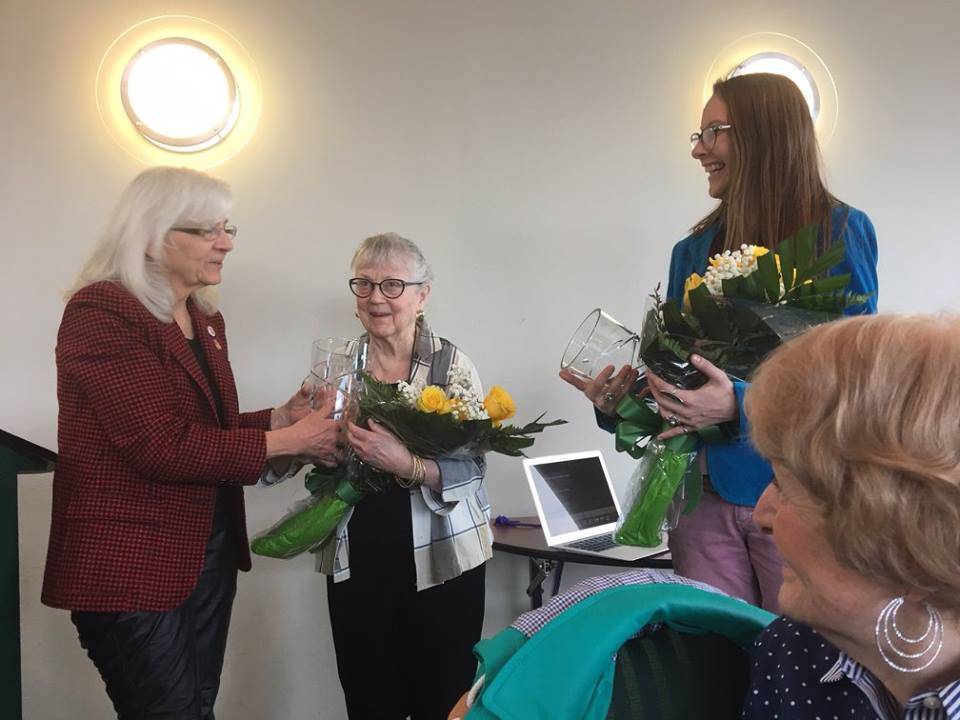

2018 Starkweather Award Recipients Nathalie "Nat" Edmunds Jane Bird Schmiedeke with their trophies.
Jane and Nat's collaboration on historical preservation grew out of a mutual love for antiques. They were appalled to discover that Ypsilanti's Master Plan in the '60s visualized the demolition of the original Fire Station at Huron and Cross, Depot Town for an industrial park, and an entire block of historic houses on the east side of N. Huron St. (including Mary Ann Starkweather's home at 130 N. Huron and the Ypsilanti Historical Museum) for a senior high rise. Nat called Jane and they swung into action.
Nat fought city hall by joining City Council where she served from 1970 to 1983, a time when there were very few women in politics. Her priority: change the city's Master Plan and define a historic district to preserve the buildings specifically marked for extinction and others that might be.
Armed with PA 169 of 1970 which enabled historic districts, Jane volunteered thousands of hours with local architect Ward Schwartz to photograph each historic building, determine its age, architecture and historical significance and prepare justifications for including each in a historic district. Jane then proposed a district to encompass as many historic buildings as possible. In 1972, Jane submitted the plan and Nat introduced the proposed ordinance to City Council. The district boundaries were approved. The ordinance was not.
Seeing the need for support of the district, Jane and Nat successfully recruited pro-preservation candidates for City Council. The ordinance defining the Ypsilanti Historic District - Michigan's second largest - passed in December 1978.
City Council established The Historic District Commission (HDC) as the city's legal arm for preservation and decisions on requests for changes to the exteriors of buildings in the new district. Jane chaired, Nat was vice-chair. The HDC's authority was promptly challenged in court when a permit to demolish the historic Towner House was denied. Despite opposition, the commission and city prevailed.
Together, Nat and Jane were unstoppable - Nat more the big picture strategist while Jane commanded the field. Their accomplishments preserved the built environment of our community and inspired several generations of preservationists.
Nat passed away at 93 in December 2017. Her granddaughter Christine accepted the Starkweather Award on Nat's behalf. Jane, still vigorous in her 90's, remains active with the Historic District Commission and the Heritage Foundation in addition to being a volunteer at St. Joseph Mercy Hospital.
2017 Starkweather Award Recipient Kathleen Fojtik Stroud
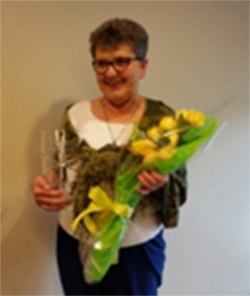

2017 Starkweather Award Recipient Kathleen Fojtik Stroud with her trophy.
Kathleen Fojtik-Stroud is the founder of Ann Arbor's Safehouse. In 1978, at great risk to herself and the providers, she helped create a network of private homes that provided safe shelter for women and children who were victims of domestic violence. This was at a time when many believed that violence was a private 'family affair' and looked away. In 1992, Safehouse was opened as the first publicly funded domestic shelter in the United States.
Kathleen has also been active with the National Organization for Women since its founding 50 years ago, serving in various capacities including president of the Ann Arbor chapter and board member of Michigan NOW. She is active in the local chapter of the American Association of University Women (AAUW) and has served as president. In addition, Fojtik-Stroud has been a Washtenaw County Commissioner, a precinct delegate for the Democratic party, and has generously supported progressive candidates and causes over the years. She is a 1972 graduate of EMU in occupational therapy.
2016 Starkweather Award Recipient Hon. Alma Wheeler Smith
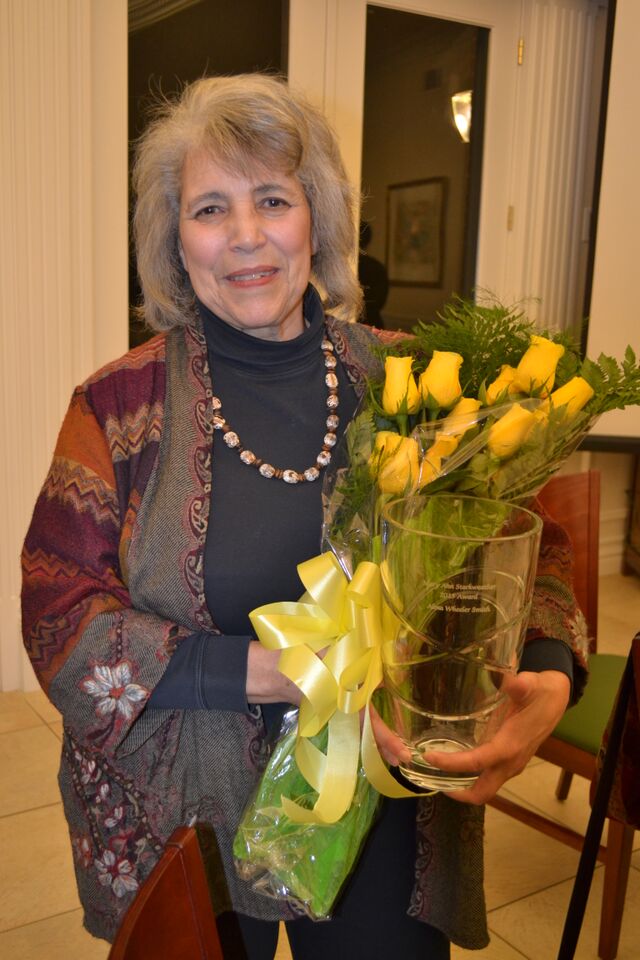

2016 Starkweather Award Recipient Hon. Alma Wheeler Smith with her trophy.
Senator Alma Wheeler Smith served in the Michigan State Legislature for 14 years, sitting on the powerful Appropriations Committee. Her focus was consumer protection, public health, and equal rights. She authored a law that increased citizens' protection from lead in the environment, funded the first successful drug court program, and wrote the law protecting individual privacy on genetic testing from insurance companies and employers. She also wrote the law that provided funds for breast and cervical screening through the University of Michigan "Healthy Asian American" project, which she helped found.
Alma Wheeler Smith promoted human rights through her authorship of a law to divest Michigan retirement funds from Darfur, contributing to the pressure on the Sudanese government to end the genocide in Sudan during the 2000's. She promoted equality through the introduction of a constitutional amendment to bring Michigan into compliance with the Americans with Disabilities Act, and through a law that funded the first early childhood education program, among others.
Senator Smith has been a consistent advocate for Eastern Michigan University, and was the keynote speaker for the first Washtenaw County Women's Diversity Summit in 2007. She was the first African American to run for governor on Michigan's Democratic ticket in 2001, and was Congressman David Bonior's choice for Lieutenant Governor in his 2002 campaign for Governor.
Since her term-limit retirement from the Michigan State Legislature, Senator Wheeler Smith has been serving on the boards of University Bank, SOS Crisis Center, the Michigan Campaign Finance Network, the Legislative Retirement System, and the Southeast Michigan Regional Transit Authority. Early in her career Senator Wheeler Smith served Washtenaw County as a Cable Casting Commissioner, a School Board Trustee, President, and County Commissioner.
Senator Smith has been recognized on both sides of the political aisle as one of the most knowledgeable and effective leaders in Lansing, and has earned numerous awards from health, social, legal, and human service organizations.

